Jennifer Scoullar's Blog, page 23
November 25, 2012
Vale Bryce Courtenay
 Australia said goodbye last week to one of our most dearly loved authors. Bryce Courtenay wrote an astonishing 21 books in 23 years. He has been rightly described by his publisher at Penguin, Bob Sessions, as Australia’s own Charles Dickens. Like Dickens, Courtenay’s writing is remarkable for his larger than life characters, his complex plots and his broad popular appeal. And like Charles Dickens, Courtenay was willing to tackle social justice issues. Apartheid in The Power Of One, racial prejudice in Jessica, AIDS in April Fool’s Day - he wasn’t just a champion story-teller, but somebody who aimed to make a difference with his writing.
Australia said goodbye last week to one of our most dearly loved authors. Bryce Courtenay wrote an astonishing 21 books in 23 years. He has been rightly described by his publisher at Penguin, Bob Sessions, as Australia’s own Charles Dickens. Like Dickens, Courtenay’s writing is remarkable for his larger than life characters, his complex plots and his broad popular appeal. And like Charles Dickens, Courtenay was willing to tackle social justice issues. Apartheid in The Power Of One, racial prejudice in Jessica, AIDS in April Fool’s Day - he wasn’t just a champion story-teller, but somebody who aimed to make a difference with his writing.
 The Potato Factory trilogy was my first experience of reading Bryce Courtenay books. I loved them, and was inspired to begin writing again myself, after a break of many years. That’s the other thing he did – show people that it’s never too late to follow your dreams. Courtenay began his remarkably successful publishing career at the age of fifty-five. As a one-time ad man, he was a master of promotion, but also most generous. For example, he gave away up to 2,500 books free each year to readers he met in the street.
The Potato Factory trilogy was my first experience of reading Bryce Courtenay books. I loved them, and was inspired to begin writing again myself, after a break of many years. That’s the other thing he did – show people that it’s never too late to follow your dreams. Courtenay began his remarkably successful publishing career at the age of fifty-five. As a one-time ad man, he was a master of promotion, but also most generous. For example, he gave away up to 2,500 books free each year to readers he met in the street.
 So thank you Mr Courtenay, for being such an inspiration over so many years. How fabulous that your final novel Jack Of Diamonds, was released before you died. You’ve left us a truly remarkable legacy. And thank you also, on behalf of a grateful nation, for giving us Louie the Fly!
So thank you Mr Courtenay, for being such an inspiration over so many years. How fabulous that your final novel Jack Of Diamonds, was released before you died. You’ve left us a truly remarkable legacy. And thank you also, on behalf of a grateful nation, for giving us Louie the Fly!

November 17, 2012
Changing Titles
 Well, it’s official. My new novel, due for release in July next year, is to be renamed. Currently called Firewater, this is how the Penguin publishing team broke the news to me this week.
Well, it’s official. My new novel, due for release in July next year, is to be renamed. Currently called Firewater, this is how the Penguin publishing team broke the news to me this week.
‘The current title isn’t doing the job you want it to do. Almost universally, those coming fresh to the book, without any previous knowledge of the plot, associated the word ‘firewater’ with high-proof alcohol, or moonshine!’
Fond as I am of the original name, I can see Penguin’s point. The novel is most definitely not about illegally distilled alcohol. So, the search for a new title begins!
 The title of a novel will often alter by publication date. There is a proud history of name changes. The baffling working title of Tolstoy’s War and Peace was ’All’s Well That Ends Well’. Steinbeck’s Of Mice and Men was equally inexplicably called ’Something That Happened’. ’A Jewish Patient Begins His Analysis,’ became Portnoy’s Complaint. ‘First Impressions,’ became Pride and Prejudice. ‘Incident At West Egg’? – The Great Gatsby. ‘Private Fleming; His Various Battles’? – The Red Badge Of Courage. ‘The Dead UnDead’? – Dracula.
The title of a novel will often alter by publication date. There is a proud history of name changes. The baffling working title of Tolstoy’s War and Peace was ’All’s Well That Ends Well’. Steinbeck’s Of Mice and Men was equally inexplicably called ’Something That Happened’. ’A Jewish Patient Begins His Analysis,’ became Portnoy’s Complaint. ‘First Impressions,’ became Pride and Prejudice. ‘Incident At West Egg’? – The Great Gatsby. ‘Private Fleming; His Various Battles’? – The Red Badge Of Courage. ‘The Dead UnDead’? – Dracula.

Title scribblings for Light Years by James Salter
These early title drafts seem so absurd to readers now, partly because they already know and love the book under its final name. Likewise, it can be difficult for authors to give up the title they’ve grown used to. But my publisher is the expert, and I respect her judgement. Meanwhile, I’m writing my new novel, with a working title I won’t get too attached to. Can’t wait to announce the new title for Firewater, once it’s finalised. Looking down the fascinating list of renamed classics, I must admit the publishers invariably got it right. That’s why I’m trusting mine.

November 10, 2012
The Birth of a Book
 I’m a few thousand words into my new novel, bearing the working title of Kingfisher. For a novelist, the process of beginning a brand new story is many-faceted. Firstly, you have to leave the world of your last one behind. This isn’t as simple as it might sound. Particular characters and their problems become very real for authors, and forgetting about them can seem like emotional abandonment. But as with most relationship breakups, time tends to heal wounds. That’s why it’s important to have a hiatus between finishing your last book, and beginning the next one.
I’m a few thousand words into my new novel, bearing the working title of Kingfisher. For a novelist, the process of beginning a brand new story is many-faceted. Firstly, you have to leave the world of your last one behind. This isn’t as simple as it might sound. Particular characters and their problems become very real for authors, and forgetting about them can seem like emotional abandonment. But as with most relationship breakups, time tends to heal wounds. That’s why it’s important to have a hiatus between finishing your last book, and beginning the next one.
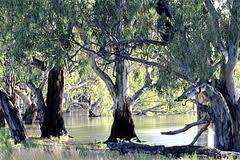 I gave myself a month-long break. During that time, the imaginary landscape of Firewater (my last novel) retreated into the distance, allowing a new one to emerge. I mulled a lot – in the garden, in the car, in the bath. I read poetry. I breathed life into shadowy characters, and tried different personalities on them for size, like a child with paper dolls and dresses. I played the ‘What if?’ game. Closing my eyes, I grew to know the Red Gum flanked river, so central to my narrative.
I gave myself a month-long break. During that time, the imaginary landscape of Firewater (my last novel) retreated into the distance, allowing a new one to emerge. I mulled a lot – in the garden, in the car, in the bath. I read poetry. I breathed life into shadowy characters, and tried different personalities on them for size, like a child with paper dolls and dresses. I played the ‘What if?’ game. Closing my eyes, I grew to know the Red Gum flanked river, so central to my narrative.
 And gradually the story took form. Obstacles stand between novelists and their new narratives. Home made obstacles. What if I can’t find my voice? What if my protagonist is boring? What if the conflict just isn’t as interesting as I think it is? So, part of preparing is giving yourself pep-talks. Trust your imagination. Trust your characters. Doubts will stem the flow of ideas. Believe in yourself as a writer. Your story deserves it.
And gradually the story took form. Obstacles stand between novelists and their new narratives. Home made obstacles. What if I can’t find my voice? What if my protagonist is boring? What if the conflict just isn’t as interesting as I think it is? So, part of preparing is giving yourself pep-talks. Trust your imagination. Trust your characters. Doubts will stem the flow of ideas. Believe in yourself as a writer. Your story deserves it.
Here’s an excerpt from The Four Quartets by TS Eliot, the poem that helped inspire Kingfisher.
‘I do not know much about gods; but I think that the river
Is a strong brown god—sullen, untamed and intractable,
Patient to some degree, at first recognised as a frontier;
Useful, untrustworthy, as a conveyor of commerce;
Then only a problem confronting the builder of bridges.
The problem once solved, the brown god is almost forgotten
By the dwellers in cities—ever, however, implacable.
Keeping his seasons and rages, destroyer, reminder
Of what men choose to forget. Unhonoured, unpropitiated
By worshippers of the machine, but waiting, watching and waiting.’
Related articles
T.S. Eliot Continues to Inspire (silverbirchpress.wordpress.com)

November 5, 2012
Our New Wombat
We have a new resident here at Pilyara – a hard-working wombat, who is digging a grand new burrow beneath a stump along the drive, just metres from the house.
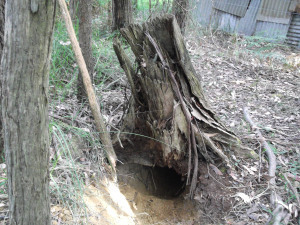 Bare Nosed Wombats (Vombatus ursinus) are endearing animals that abound here at Pilyara. They emerge at dusk to graze the paddocks, retiring during the day to the safety and comfort of their tunnels. I love wombats. Large and lumbering, they are the world’s biggest herbiverous burrowing mammals. With short legs and tail, rotund bodies and a cuddly appearance, they resemble little bears, but their closest relatives are actually koalas. Wombats are marsupials, but have hollow, rodent-like teeth, that grow in response to wear, and can gnaw through the toughest roots. Like living mini-bulldozers, they can be a problem for farmers when they meet obstacles such as fences. In winter, females produce a single baby which spends its first few months within her rear-facing pouch.
Bare Nosed Wombats (Vombatus ursinus) are endearing animals that abound here at Pilyara. They emerge at dusk to graze the paddocks, retiring during the day to the safety and comfort of their tunnels. I love wombats. Large and lumbering, they are the world’s biggest herbiverous burrowing mammals. With short legs and tail, rotund bodies and a cuddly appearance, they resemble little bears, but their closest relatives are actually koalas. Wombats are marsupials, but have hollow, rodent-like teeth, that grow in response to wear, and can gnaw through the toughest roots. Like living mini-bulldozers, they can be a problem for farmers when they meet obstacles such as fences. In winter, females produce a single baby which spends its first few months within her rear-facing pouch.
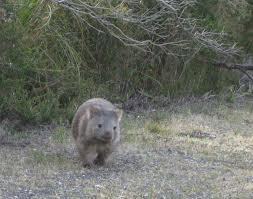 Wombats face multiple threats. Loss of habitat, dogs, traffic, unsympathetic land owners, and disease. It always saddens me to see a wombat out and about in broad daylight. Mostly these animals are suffering from sarcoptic mange, a nasty condition that causes hair loss, pain, scabby skin, starvation, blindness and ultimately death.
Wombats face multiple threats. Loss of habitat, dogs, traffic, unsympathetic land owners, and disease. It always saddens me to see a wombat out and about in broad daylight. Mostly these animals are suffering from sarcoptic mange, a nasty condition that causes hair loss, pain, scabby skin, starvation, blindness and ultimately death.
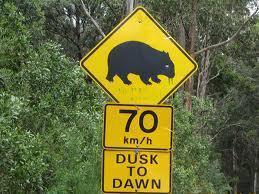 Wombats are also killed by cars, and their corpses are a common sight on local roadsides. Dedicated carers, like Reg and Jenny Mattingly of the Maryknoll Wildlife Shelter, rescue and rear dozens of orphaned baby wombats each year. They also provide burrow flaps to treat mangy wombats with a dose of Cydectin as they enter or leave their dens. Which brings me to our new, resident wombat. It’s nice to know that if he or she contracts mange, we know where the burrow is!
Wombats are also killed by cars, and their corpses are a common sight on local roadsides. Dedicated carers, like Reg and Jenny Mattingly of the Maryknoll Wildlife Shelter, rescue and rear dozens of orphaned baby wombats each year. They also provide burrow flaps to treat mangy wombats with a dose of Cydectin as they enter or leave their dens. Which brings me to our new, resident wombat. It’s nice to know that if he or she contracts mange, we know where the burrow is!

October 27, 2012
National Novel Writing Month
 November is National Novel Writing Month (also known as NaNoWriMo) … thirty days and thirty nights of literary abandon. The idea is to finish a 50,000 word manuscript in a month, or to at least write the first 50,000 words of a longer novel. I have signed up this year, as coincidentally I’m beginning my new novel in November, but I do feel like a bit of a fraud. My expectation isn’t to finish the manuscript by December, but I do intend to give it a big kick start. It’s all about fun and motivation.
November is National Novel Writing Month (also known as NaNoWriMo) … thirty days and thirty nights of literary abandon. The idea is to finish a 50,000 word manuscript in a month, or to at least write the first 50,000 words of a longer novel. I have signed up this year, as coincidentally I’m beginning my new novel in November, but I do feel like a bit of a fraud. My expectation isn’t to finish the manuscript by December, but I do intend to give it a big kick start. It’s all about fun and motivation.
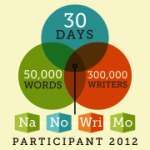 Writers wishing to participate first register on the project’s website, where they can post profiles and information about their novels, including synopses and excerpts. This annual novel writing project brings together professional and amateur writers from all over the world. Participants begin writing on November 1. The goal is to write 50,000 words (approximately 175-page) by 11:59:59 PM on November 30th. Because of the limited writing window, the main thing that matters in NaNoWriMo is output. It’s all about quantity, not quality. This approach forces you to lower your expectations, take risks, and write on the fly.
Writers wishing to participate first register on the project’s website, where they can post profiles and information about their novels, including synopses and excerpts. This annual novel writing project brings together professional and amateur writers from all over the world. Participants begin writing on November 1. The goal is to write 50,000 words (approximately 175-page) by 11:59:59 PM on November 30th. Because of the limited writing window, the main thing that matters in NaNoWriMo is output. It’s all about quantity, not quality. This approach forces you to lower your expectations, take risks, and write on the fly.
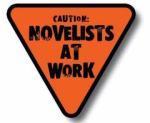 As you spend November writing, you can draw comfort from the fact that, all around the world others are agonising over their novels and pounding away on their computers too. In 2011, there were 256,618 participants and 36,843 of them crossed the 50K finish line by the midnight deadline. Due to family commitments, I won’t actually be starting until November 6th, which puts me a bit behind the eight ball right from the start. Still, I’ll be interested to see if the peer group pressure aspect of the project, spurs me on.
As you spend November writing, you can draw comfort from the fact that, all around the world others are agonising over their novels and pounding away on their computers too. In 2011, there were 256,618 participants and 36,843 of them crossed the 50K finish line by the midnight deadline. Due to family commitments, I won’t actually be starting until November 6th, which puts me a bit behind the eight ball right from the start. Still, I’ll be interested to see if the peer group pressure aspect of the project, spurs me on.
Anybody else signed up for NaNoWriMo? I’d love to hear your thoughts. Now, off to make a profile …

October 20, 2012
Berwick Mechanics Institute Library Turns 150
 This quaint and unique little library in Main Street Berwick is celebrating a significant milestone – its 150th birthday. Mechanics Institutes were born in Scotland and England during the 1800′s. Their primary purpose was self-improvement and education of the working classes, and their libraries provided up-to-date information including government notices, newspapers, magazines, books and journals.
This quaint and unique little library in Main Street Berwick is celebrating a significant milestone – its 150th birthday. Mechanics Institutes were born in Scotland and England during the 1800′s. Their primary purpose was self-improvement and education of the working classes, and their libraries provided up-to-date information including government notices, newspapers, magazines, books and journals.
When it first began in 1862, the Berwick Mechanics Institute Library, was open from 8am to 10pm daily. It served as a community hub, popular for penny readings and lectures by locals and visiting dignitaries. Pam Darling, who died recently at the age of ninety, was the library’s longest serving manager. It was her job to light two fires in winter, one in the meeting room and one in the reading room. The key hung on a verandah post of the Commonwealth Bank so groups could let themselves in.
 The set up of a new regional library service in 1972 marked the start of a 15 year battle to save the library from being taken over. It had two big assets though. One was a 500 year lease signed in 1878, and the other was its cost effective service. These days, over 30 volunteers ensure that the little library is as popular as ever. It opens four and a half days a week, loans 40,000 books annually and has 17,000 registered borrowers.
The set up of a new regional library service in 1972 marked the start of a 15 year battle to save the library from being taken over. It had two big assets though. One was a 500 year lease signed in 1878, and the other was its cost effective service. These days, over 30 volunteers ensure that the little library is as popular as ever. It opens four and a half days a week, loans 40,000 books annually and has 17,000 registered borrowers.
Next Wednesday (24th October) the Berwick Library will celebrate its past, present and future with an open day. Morning and afternoon tea will be available, and the hard working committee members hope people will come in droves to celebrate with them. I for one will be there, with a couple of my books to donate. How marvellous, that small independent libraries like this can still flourish in our modern world!

October 13, 2012
Earning Out that Advance
 I recently read an interesting article on Crikey about how authors are paid. (Advance Australian Authors Fair) According to Fiona Inglis, Managing Director of Curtis Brown Literary Agency, ‘We consider money vulgar.’ This seems to be the general consensus in the publishing world, so in the same spirit I’ll confess to receiving a five figure advance for Brumby’s Run, and leave it at that. Stories abound of authors who never earn out their advance, with figures as high as seventy percent being reported by the New York Times. I’m therefore relieved to announce I’ve officially earned out my advance for Brumby’s Run after only three months. A huge thank you to all my wonderful readers out there who have made this happen! Thanks to Penguin Books Australia as well, most particularly to my lovely publisher, Belinda Byrne.
I recently read an interesting article on Crikey about how authors are paid. (Advance Australian Authors Fair) According to Fiona Inglis, Managing Director of Curtis Brown Literary Agency, ‘We consider money vulgar.’ This seems to be the general consensus in the publishing world, so in the same spirit I’ll confess to receiving a five figure advance for Brumby’s Run, and leave it at that. Stories abound of authors who never earn out their advance, with figures as high as seventy percent being reported by the New York Times. I’m therefore relieved to announce I’ve officially earned out my advance for Brumby’s Run after only three months. A huge thank you to all my wonderful readers out there who have made this happen! Thanks to Penguin Books Australia as well, most particularly to my lovely publisher, Belinda Byrne.
 Publishers offer the advance they project your book will earn back in the first six to twelve months after publication. This sum is advanced against future royalties, kind of like a loan. It needs to be paid back before an author will see one more cent from book sales. If royalties earned fall short of that initial advance, then the author has failed to earn out, and the publisher might be reluctant to contract them again.
Publishers offer the advance they project your book will earn back in the first six to twelve months after publication. This sum is advanced against future royalties, kind of like a loan. It needs to be paid back before an author will see one more cent from book sales. If royalties earned fall short of that initial advance, then the author has failed to earn out, and the publisher might be reluctant to contract them again.
There is nothing quite so satisfying as receiving that first royalty cheque, however modest. It means your book has lived up to publisher expectations. Very good news indeed.

October 7, 2012
Orchids at Pilyara

Eastern Bronze Caledenia
One of the joys of living surrounded by bushland is the never ending variety of life that passes by, season by season. In spring, the wildflowers and birds provide spectacular flashes of colour. Here at Pilyara the soil lacks some of the richness found elsewhere, and this is the situation favoured by many ground orchids, or rather they have adapted well to such soils. Under the canopy of Messmate, small colonies of orchids can be found. Several species have begun to flower, and more will follow in the weeks to come.

Tall Sun Orchid
Many Australian orchids depend on mimicry to attract pollinators, using pheromones similar to those given off by female wasps. These orchids generally have unspectacular flowers, although in an attempt to appear wasplike their forms can be remarkable.Those that attempt to attract pollinators using colour and perfume are more spectacular. The most showy varieties at Pilyara are the sun-orchids, so called because their flowers only open on warm sunny days.

Large Bird Orchid
The profusion of orchids found at Pilyara is not rare, or even uncommon. I’m still waiting to find something really unusual hiding away. But as more and more bushland disappears, the rare vanishes, the uncommon becomes rare, and the ordinary takes its place as vulnerable. What a responsibility we have as stewards of this earth!
(Photos courtesy of my brother, Rod Scoullar)

September 30, 2012
A Novel Idea
My recently finished manuscript Firewater, is finally with my agent and publisher. Here is a brief blurb.
When Brisbane lawyer, Clare Mitchell, becomes the unlikely carer of Jack, a little autistic boy, her life is turned upside down. In desperation she turns her back on her job, and takes Jack to Bundara, her grandfather’s Clydesdale stud at Merriang, in the foothills of the beautiful Bunya Mountains. She arrives to find part of the property leased by local vet, Tom Lord, an advocate of equine therapy for traumatised children. Jack falls in love with Bundara’s animals, and Clare falls in love with Tom and the life of a country vet. But trouble is coming, trouble that threatens to not only destroy Clare’s new-found happiness, but the tiny town of Merriang itself.
 Firewater is due out with Penguin in July next year, and I’m pleased to report that it has been very well received by Belinda Byrne, my publisher. So while I wait for the inevitable grind of edits to begin, it’s time to plan my next novel. Some people seem to have multiple narratives swirling around in their minds at any given time. Unfortunately, I’m not one of them. It can take a long time for me to plot a new story. There are many ways to come up with fresh ideas.
Firewater is due out with Penguin in July next year, and I’m pleased to report that it has been very well received by Belinda Byrne, my publisher. So while I wait for the inevitable grind of edits to begin, it’s time to plan my next novel. Some people seem to have multiple narratives swirling around in their minds at any given time. Unfortunately, I’m not one of them. It can take a long time for me to plot a new story. There are many ways to come up with fresh ideas.
The High-Concept Approach. This is a movie term, that works something like this. Pick a tried and true scenario and tweak it a little, or a lot, and/or combine two together. My friend and publishing buddy, Kathryn Ledson, used this concept to successfully write, and then sell her Erica Jewell series to Penguin (The first book, Rough Diamond, will be out with Penguin in January) It’s a cross between Bridget Jones and Indiana Jones.
 Read Read everything you can in your chosen genre or area of interest. Allow another imagination to cross-fertilise your own. There’s much truth in the old adage, show me a writer that’s not reading, and I’ll show you a writer that’s not writing.
Read Read everything you can in your chosen genre or area of interest. Allow another imagination to cross-fertilise your own. There’s much truth in the old adage, show me a writer that’s not reading, and I’ll show you a writer that’s not writing.
Look Around You Keep a keen eye on what topics are in the news. What are your friends talking about? What concerns keep you awake at night? Eavesdropping is also a useful skill for writers. Listen in when other people talk. Mobile phone conversations on trains are good for this. Don’t let them annoy you – let them inspire you.
 Hang out in bookstores. This is critical. Pay close attention to those marked New Releases. Get to know what’s new and hot in your area. Find out what’s selling, and to which publishers. Remember that you need an idea that other people (not just you!) can get excited about.
Hang out in bookstores. This is critical. Pay close attention to those marked New Releases. Get to know what’s new and hot in your area. Find out what’s selling, and to which publishers. Remember that you need an idea that other people (not just you!) can get excited about.
As I said last week, I have a vague idea for the new novel. My task for October is to develop a rough plan, with themes and characters that will sustain me over the next twelve months of writing.

September 22, 2012
The New Quad Bike
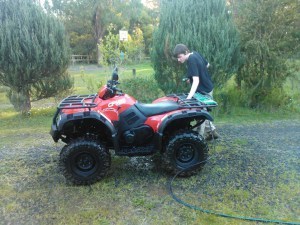 What’s a fun, practical and slightly extravagant way to spend the advance on signing for my new novel Firewater? Buy a brand new quad bike, of course. Meet the Wombat, a CFMoto ATV/Quadricycle, being touted as Australia’s best value ATV – a workhorse suited for the farm or simply fun. For anybody who is interested, here is the manufacturer’s blurb.
What’s a fun, practical and slightly extravagant way to spend the advance on signing for my new novel Firewater? Buy a brand new quad bike, of course. Meet the Wombat, a CFMoto ATV/Quadricycle, being touted as Australia’s best value ATV – a workhorse suited for the farm or simply fun. For anybody who is interested, here is the manufacturer’s blurb.
A rugged performer, the CFMoto comes standard with a list of features representing unparalleled value. A powerful 500cc liquid cooled engine and CVT transmission (continuous variable transmission) provides on call and
manageable power. To further enhance versatility, the rider also has the ability to electronically select between 2WD & 4WD modes, HI and LOW ranges and lock the differential when extra traction is required. A solid independent rear suspension (IRS) package helps minimise body roll and ensure a smooth and stable ride. The 19 litre fuel tank allows the CF500 to run for hours and the front and rear racks come in handy for cargo. The CF500 is supported by a one year limited factory warranty and nation-wide dealer network.
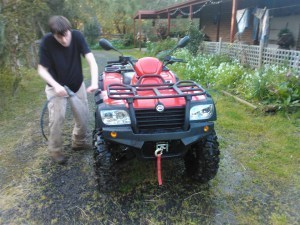 I’m even getting a custom-made trailer, which fits a 150 litre spray unit. Ragwort and blackberries, meet your doom! My youngest son is seventeen years old, and thinks all his Christmases have come at once. The photos show him washing the Wombat, of his own free will. Will wonders never cease?
I’m even getting a custom-made trailer, which fits a 150 litre spray unit. Ragwort and blackberries, meet your doom! My youngest son is seventeen years old, and thinks all his Christmases have come at once. The photos show him washing the Wombat, of his own free will. Will wonders never cease?
I’m currently doing revisions of the first draft of Firewater. The deadline for turning the manuscript in to Penguin is October 3rd, and I should be able to manage that. Then a month long break from writing, before I tackle my new novel. It’s just a kernel of an idea at the moment. I suspect my writing free October will be a month of mulling.





